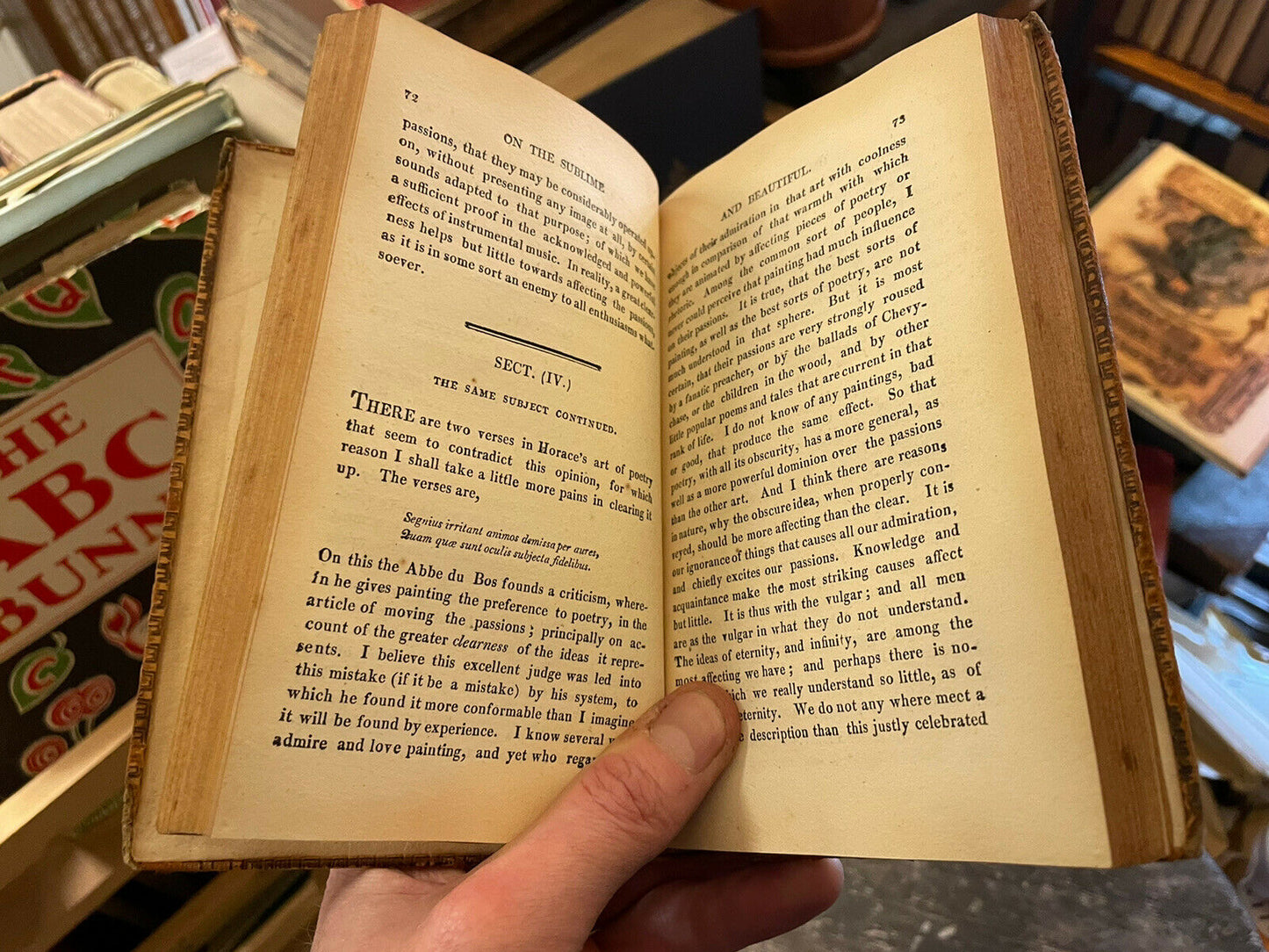1
/
of
6
The Gently Mad Book Shop
1807 Edmund Burke : Philosophical Enquiry . . Sublime and Beautiful : Scarce
1807 Edmund Burke : Philosophical Enquiry . . Sublime and Beautiful : Scarce
Regular price
£85.00 GBP
Regular price
Sale price
£85.00 GBP
Unit price
/
per
Tax included.
Couldn't load pickup availability
A Philosophical Enquiry into the Origin of Our Ideas of the Sublime and Beautiful
With an Introductory Discourse Concerning Taste and Several Other Additions
By Edmund Burke
Printed by J Wright, London, 1807. Full leather binding (rebacked). Book measures 16 x 10cm. 219 pages.
CONDITION
Good condition throughout. The leather binding has had a new spine added at some point in the past but the original boards and endpapers have been retained. All contents present and pages clean throughout. Small neat name to the front inside board. Overall good.
Edmund Burke (12 January, 1729 – 9 July 1797) was an Irish-born British statesman, economist, and philosopher. Born in Dublin, Burke served as a member of parliament (MP) between 1766 and 1794 in the House of Commons of Great Britain with the Whig Party.
Burke was a proponent of underpinning virtues with manners in society and of the importance of religious institutions for the moral stability and good of the state. These views were expressed in his A Vindication of Natural Society. He criticised the actions of the British government towards the American colonies, including its taxation policies. Burke also supported the rights of the colonists to resist metropolitan authority, although he opposed the attempt to achieve independence. He is remembered for his support for Catholic emancipation, the impeachment of Warren Hastings from the East India Company, and his staunch opposition to the French Revolution.
In his Reflections on the Revolution in France, Burke asserted that the revolution was destroying the fabric of good society and traditional institutions of state and society and condemned the persecution of the Catholic Church that resulted from it. This led to his becoming the leading figure within the conservative faction of the Whig Party which he dubbed the Old Whigs as opposed to the pro–French Revolution New Whigs led by Charles James Fox.
In the 19th century, Burke was praised by both conservatives and liberals. Subsequently, in the 20th century, he became widely regarded, especially in the United States, as the philosophical founder of conservatism
With an Introductory Discourse Concerning Taste and Several Other Additions
By Edmund Burke
Printed by J Wright, London, 1807. Full leather binding (rebacked). Book measures 16 x 10cm. 219 pages.
CONDITION
Good condition throughout. The leather binding has had a new spine added at some point in the past but the original boards and endpapers have been retained. All contents present and pages clean throughout. Small neat name to the front inside board. Overall good.
Edmund Burke (12 January, 1729 – 9 July 1797) was an Irish-born British statesman, economist, and philosopher. Born in Dublin, Burke served as a member of parliament (MP) between 1766 and 1794 in the House of Commons of Great Britain with the Whig Party.
Burke was a proponent of underpinning virtues with manners in society and of the importance of religious institutions for the moral stability and good of the state. These views were expressed in his A Vindication of Natural Society. He criticised the actions of the British government towards the American colonies, including its taxation policies. Burke also supported the rights of the colonists to resist metropolitan authority, although he opposed the attempt to achieve independence. He is remembered for his support for Catholic emancipation, the impeachment of Warren Hastings from the East India Company, and his staunch opposition to the French Revolution.
In his Reflections on the Revolution in France, Burke asserted that the revolution was destroying the fabric of good society and traditional institutions of state and society and condemned the persecution of the Catholic Church that resulted from it. This led to his becoming the leading figure within the conservative faction of the Whig Party which he dubbed the Old Whigs as opposed to the pro–French Revolution New Whigs led by Charles James Fox.
In the 19th century, Burke was praised by both conservatives and liberals. Subsequently, in the 20th century, he became widely regarded, especially in the United States, as the philosophical founder of conservatism
(Loc: Home LR )
Share with someone












